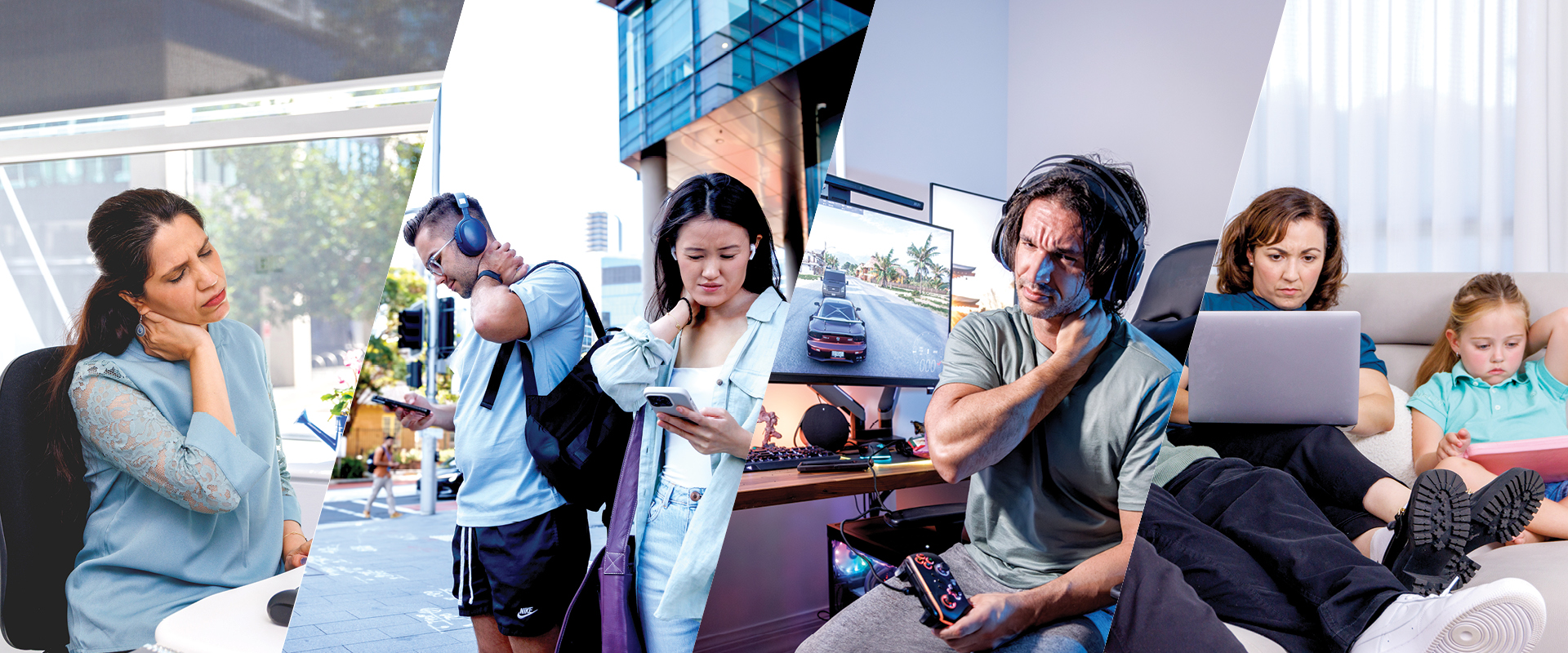
Spinal Health Week 2025
Get the heads up on tech neck this National Spinal Health Week (26 May to 1 June 2025)
National Spinal Health Week (26 May to 1 June 2025) is the flagship initiative of the Australian Chiropractors Association (ACA). For almost 30 years, ACA’s annual community health initiative has shone a spotlight on spinal health issues that affects millions of Australians while encouraging individuals and communities across our nation to take proactive steps to improve spinal health.
In 2025, our campaign targets Tension Neck Syndrome. Commonly known as ‘tech neck’ or ‘text neck’, the condition is a global health concern caused by poor posture and the prolonged or incorrect use of digital devices, including smartphones, tablets and computers.
With prevention the best protection, get the heads up on tech neck and join the Spinal Health Week movement to learn and share practical strategies that can help prevent tech neck, support spinal health, and reduce the economic and personal burden of MSDs.
About
An initiative of the Australian Chiropractors Association, national Spinal Health Week is Australia’s longest-running, award winning awareness campaign dedicated to improving spinal health by preventing musculoskeletal disorders (MSDs).
Annually, MSDs (including tech neck) cost the Australian economy over $55 billion and with neck pain affecting 1 in 5 Australians, Spinal Health Week 2025 aims to educate Australians about the risks of developing tech neck and provide tips on how to prevent the disorder.
Past and present Spinal Health Week and Workspace Week participants
Annually, community leaders from governments (federal, state and local) not-for-profits, businesses, organisations and education facilities from across the nation join ACA’s movement to improve the spinal health of all Australians.
Government departments or agencies across Federal, State and Local Government
Department of Defence (Federal); Department of Planning, Lands and Heritage (WA); Department of Premier and Cabinet Tasmania; Legislative Council Tasmania, Parliament of Victoria, Parliament of Western Australia, Queensland Health, Queensland Parliament, SafeWork NSW; SafeWork SA; Tasmanian; Government, WorkSafe Tasmania and WorkSafe Victoria.
Associations and Not-For-Profits
Australian Chamber of Commerce and Industry, Australian Association of Psychologists Inc, Australian Council of State School Organisations, Australian Institute of Office Professionals (AIOP), Australian HR Institute, The Australian Industry Group, Australian Marketing Institute, Australian Psychological Society, Australian Society of Medical Imaging and Radiation Therapy, Chris O’Brien Lifehouse, Early Childhood Services and Training, Financial Counsellors’ Association of WA, Local Government association of Australia, Local Government Association of Tasmania, Massage and Myotherapy Association Australia, Master Builders Tasmania, Master Plumbers SA, National Disability Australia, Stats Australia, UNITED Spanish Latin American Welfare Association, Uniting Church (Queensland) and Work Healthy Australia.
Australian Federal and State Politicians (MPs, Senators, MLAs & MLCs) and Parties
Melissa Abbott MP (NSW), Jenny Aitchison MP (NSW), Rory Amon MP (NSW), Ros Bates MP (QLD), Vica Bayley MP (TAS), Kelly Brady MLC (WA), Geoff Brock MP (SA), Meg Brown MP (TAS), Liza Butler MP (NSW), Peter Cain MLA (ACT), Oly Carlson MP (NT), Sandra Carr MLC (WA), Leanne Castley MLA (ACT), Anthony Cianflone MP (VIC), Chris Crewther MP (VIC), Tanya Davies MP (NSW), Paul Fletcher MP (Federal), John Fulbrook MP (SA), Mike Gaffney MLC (TAS), Hon Colin de Grussa MLC (WA), Nathan Hagarty MP (NSW), David Harris MP (NSW), Michael Healy MP (QLD), Sonia Hornery MP (NSW), Catherine Hutchesson MP (SA), Tim James MP (NSW), Kristie Johnston MO (TAS), Charishma Kaliyanda MP (NSW), Nicole Lawder MLA (ACT), Caitlyn Long MP (NSW), Aileen MacDonald MLC (NSW), Hon Peter Malinausklas MP (SA), Jacqueline Marchant MP (NSW), Gary Maas MP (VIC), Hugh McDermott MP (NSW), Paul Mercurio MP (VIC), Louise Miller-Frost MP (Federal), Sophia Moermond MLC (WA), Hon Tung Ngo MLC (SA), Kim O’Keefe MP (VIC), Hon Madeleine Ogilvie MP (TAS), Shelly Payne MLC (WA), Hon Curtis Pitt MP (QLD), Penny Pratt MP (SA), John Quigley MLA (WA), Margaret Quirk MLA (WA), Dan Repacholi MP (Federal), Jordan Ryan MP (NSW), Tom Smith MP (QLD), Jimmy Sullivan MP (QLD), Angus Taylor MP (Federal), Olivia Savvas MP (SA), Liesl Tesch MP (NSW), Tanya Thompson MP (NSW), Kathy Tracey MP (NSW), Maria Vamvakinou MP (Federal), Gareth Ward MP (NSW), Kylie Wilkinson MO (NSW), Leslie Williams MP (NSW), Simon Wood MP (TAS), Dheran Young MLA (NT) and Mr Terry Young MP (Federal). ACT Greens and Tasmanian Liberal Government.
Local Government and Councils
Alice Springs Town Council (NT), Augusta Margaret River Shire (WA), Aurukun Shire Council (QLD), Ballina Shire Council (NSW), Baw Baw Shire Council (VIC), Bayside Council (NSW), Bogan Shire Council (NSW), Break O’Day Council (TAS), Brewarrina Shire Council (NSW), Bundaberg Regional Council (QLD), Burnie City Council (TAS), Cairns Regional Council (QLD), Circular Head Council (TAS), City of Albany (WA), Canterbury Bankstown City Council (NSW), Carpentaria Shire Council (QLD), Central Coast Council (NSW), Central Coast Council (TAS), City of Albany (WA), City of Ballarat (VIC), City of Kalamunda (WA), City of Melville (WA), City of Mitcham (SA), City of Parramatta (NSW), City of Perth (WA), City of Port Adelaide Enfield (SA), City of Rockingham (WA), City of Ryde (NSW), City of Salisbury (SA), City of Subiaco (WA), City of Sydney (NSW), City of Swan (WA), City of Wanneroo (WA), Coomalie Community Government Council (NT), Cootamundra-Gundagai Regional Council (NSW), Corangamite Shire Council (VIC), Cumberland Council (NSW), Devonport City Council (TAS), District Council of Lower Eyre Peninsula (SA), East Gippsland Shire Council (VIC), Forbes Shire Council (NSW), Frankston City Council (VIC), Glen Innes Severn Council (NSW), Glenorchy City Council (TAS), Greater Shepparton City Council (VIC), Griffith City Council (NSW), Gwydir Shire Council (NSW), Gympie Council (QLD), Hawkesbury City Council (NSW), Hornsby Shire Council (NSW), Hunter’s Hill Council (NSW), Huon Valley Council (TAS), Indigo Shire Council (VIC), Innerwest Council (NSW), Kangaroo Island Council (SA), Kempsey Shire Council (NSW), Kingston District Council (SA), Ku-ring-gai Council (NSW), Liverpool City Council (NSW), Livingstone Shire Council (QLD), Manningham City Council (VIC), Mareeba Shire Council (QLD), Merri-bek City Council (VIC), Midwestern Regional Council (NSW), Mildura Rural City Council (VIC), Mitchell Shire Council (VIC), Mornington Shire Council (QLD), Murrindindi Shire Council (VIC), Narrabri Shire Council (NSW), Narrandera Shire Council (NSW), Northern Beaches Council (NSW), Penrith City Council (NSW), Pormpuraaw Aboriginal Shire Council (QLD), Port Augusta City Council (SA), Port Pirie Regional Council (SA), Pyrenees Shire Council (VIC), Quilpie Shire Council (QLD), Randwick City Council (NSW), Renmark Paringa Council (SA), Scenic Rim Regional Council (QLD), Shire of Boyup Brook (WA), Shire of Capel (WA), Shire of Carnamah (WA), Shire of Chapman Valley (WA), Shire of Exmouth (WA), Shire of Harvey (WA), Shire of Kojonup (WA), Shire of Menzies (WA), Shire of Merredin (WA), Shire of Moora (WA), Shire of Narrogin (WA), Shire Of Tammin (WA), Shire of Victoria Plains (WA), Shire of West Arthur (WA), Shire of Wyalkatchem (WA), Snowy Monaro Regional Council (NSW), Snowy Valleys Council (NSW), South Burnett Regional Council (QLD), Southern Downs Regional Council (QLD), Southern Grampians Shire Council (VIC), Swan Hill Rural City Council (VIC), The Barossa Council (SA), The Hills Shire Council (NSW), Town of Mosman Park (WA), Town of Port Hedland (WA), Towong Shire Council (VIC), Wagga Wagga City Council (NSW), Waratah-Wynyard Council (TAS), Wattle Range Council (SA), Wentworth Shire Council (NSW), West Tamar Council (TAS), Whitehorse City Council (VIC), Willoughby City Council (NSW), Wollondilly Shire Council (NSW), Woollahra Council (NSW), Wyndham Council (VIC), Yarrabah Aboriginal Shire Council (QLD) and Yorke Peninsula Council (SA).
Universities
CQU – Central Queensland University, Griffith University, Murdoch University, Southern Cross University
Community Registrations
Register for National Spinal Health Week 2025
With over 6.1 million Australians living with MSDs including debilitating spine-related neck pain, organisations including government agencies, corporations, businesses and education facilities nationally, are registering in the Spinal Health Week movement to help improve the spinal health of all Australians.
By registering in national Spinal Health Week, you’ll be sharing a vital health message to help prevent within your organisation and the wider community. We’re encouraging all Australians, particularly frequent tech users, parents, students, and office workers, to adjust their thinking on how they use devices and take proactive steps to prevent and manage tech neck.
Why community support matters
By supporting Spinal Health Week, you’ll be sharing this vital health message within your organisation and the wider community. We’re encouraging all Australians, particularly frequent tech users, parents, students, and office workers, to adjust their thinking on how they use devices and take proactive steps to prevent and manage tech neck.
We invite you to:
- Share FREE downloadable resources with your networks
- Raise awareness across workplaces, schools, and communities
- Participate in the Align & Shine Awards, recognising outstanding community participation
Registered supporters receive access to our free digital toolkit, including:
- Tech Neck factsheets for adults, students and parents
- Ergonomic and postural checklists for workplaces and home
- Social media captions + images and graphics
- Printable posters and digital graphics to encourage communities to “get the heads up on tech neck”
- Media release, promotional copy and newsletter templates
To register and access these FREE campaign resources, click here.
Annually, community leaders from governments (federal, state and local) not-for-profits, businesses, organisations and education facilities from across the nation join ACA’s movement to improve the spinal health of all Australians. A list of past and current community participants is available on our ‘About’ page.
What is Tech Neck?
 Tech neck is the informal term used to describe Tension Neck Syndrome (TNS), a cervical spine related musculoskeletal disorder (MSD) also referred to as ‘text neck’.
Tech neck is the informal term used to describe Tension Neck Syndrome (TNS), a cervical spine related musculoskeletal disorder (MSD) also referred to as ‘text neck’.
What causes tech neck?
Academic studies show incorrect and non-ergonomic posture habits while using mobile devices including smartphones and tablets; and poorly setup computers (including laptops) at home, school, university or in the workplace, can increase pressure on the cervical spine leading to tech neck.
Who are most at risk of tech neck?
Anyone who regularly uses a smartphone, tablet or computer in any setting including during leisure time, is at risk of developing tech neck. But it’s not the tech that’s the pain in the neck, it’s how we use it!
With over 34 million mobile phone connections and 95 percent of the Australian population accessing the internet via a smartphone, spending too much time with the head bent forward reading or scrolling smartphones or tablets has been proven to cause tech neck.
Computer use is also linked to tech neck. With computer usage an everyday activity for over 75% of Australians aged 16 to 64, the condition is common among those who frequently use computers particularly office workers and students.
Preventing Tech Neck
 How to prevent tech neck
How to prevent tech neck
Awareness of how to correctly use electronic devices and the importance of minimising the frequency and duration of use, plays a major role in preventing tech neck.
To help prevent tech neck, avoid incorrect, non-ergonomic posture habits when using smart devices and computers. Maintain good posture, take frequent breaks at regular intervals and do stretching exercises. Importantly, maintaining regular exercise not only helps to prevent tech neck but can improve spinal health and overall health and wellbeing.
ACA’s Top Ten Tips for Tech Neck Prevention
- SIT WITH COMFORTABLE UPRIGHT POSTURE with shoulders relaxed and feet flat on the floor.
- STOP BENDING THE NECK to look down at a phone or tablet. Hold the device at eye level.
- LIMIT THE TIME spent using a phone to 2 hours per day, especially during leisure time.
- USE BOTH HANDS or alternate between left and right when typing on a smartphone.
- DON’T WALK LOOKING DOWN at a phone. Hold your head up straight and engage with the world.
- TAKE REGULAR MOVEMENT BREAKS to look away from your device, move your neck from side to side and stretch every 10 minutes if using mobile devices and every 30 minutes if using computers.
- ENSURE COMPUTERS are ergonomically set up correctly so the monitor is at eye level.
- USE AN ADJUSTABLE ergonomic office chair so the knees are slightly lower than the hips.
- EXERCISE REGULARLY to maintain a healthy spine and overall health and wellbeing.
- CONSULT AN ACA CHIROPRACTOR to limit and treat spinal health problems including tech neck.
For parents, it’s also recommended that parents and carers limit screen time in accordance with the Australian Institute of Family Studies guidelines and keep children and young people active to maximise their physical and mental development, spinal health and overall health and wellbeing.
Factsheets
Get the Heads Up on Tech Neck!
To help minimise the occurrence of tech neck among Australians of all ages, ACA has developed a range of user-friendly resources including factsheets that are FREE to download and share.
These resources can be used at home, at school or displayed in the workplace to help minimise tech neck among students and colleagues including:
- Heads Up on Tech Neck (General Use)
- Heads Up on Tech Neck for Parents
- Heads Up on Tech Neck for Students
Additional information to help prevent tech neck can be found in ACA’s range of unique checklists and posters including the following:
- Ergonomic Checklist
- Electronic Device Use Checklist (for adults & students)
- Electronic Device Use Checklist (for children)
- Heads Up on Tech Neck Postural Guide Poster
- Stand Corrected Stretching Poster
Consult a Chiro
 What are the spinal health implications of unresolved tech neck?
What are the spinal health implications of unresolved tech neck?
Unresolved tech neck can be debilitating, leading to headaches, neck, shoulder, and upper back pain. The severity of symptoms often correlates with the amount of time spent using smartphones or other electronic devices like tablets and computers. Over time, this can even alter the natural curve of the cervical spine.
How to minimise the impact of tech neck and improve overall spinal health and wellbeing
For those suffering from tech neck, studies show that it’s crucial to commence treatment promptly to prevent further functional decline. For effective treatment outcomes achieved through a combination of strengthening and stretching exercises, manual therapy and postural correction, consult an ACA chiro.
Every week over 400,000 chiropractic healthcare consultations help create well-adjusted Australians as ACA chiropractors play an important role in improving the spinal health of everyday Australians.
If you or someone you know suffers from tech neck, consult an ACA chiropractor. Chiropractic healthcare is an effective drug-free and low-risk treatment and is one of the most preferred treatment options for neck and back pain caused by tech neck.
To treat tech neck and improve your overall spinal health and wellbeing, find your local ACA chiropractor by visiting findachiro.org.au.
Find your local ACA chiropractorSHW Online Competition
 Enter our SHW online competition by simply telling us in 50 words or less ‘how chiropractic care has helped relieve your neck pain or tech neck symptoms’ for your chance to win a Flight Centre gift card valued at $1,000! As a condition of entry participants must also be following our Consult a Chiro Facebook and Instagram pages.
Enter our SHW online competition by simply telling us in 50 words or less ‘how chiropractic care has helped relieve your neck pain or tech neck symptoms’ for your chance to win a Flight Centre gift card valued at $1,000! As a condition of entry participants must also be following our Consult a Chiro Facebook and Instagram pages.
*COMPETITION NOW CLOSED*
Congratulations to the lucky winner of our SHW 2025 Online Competition:
Max Truong – NSW
SHW Colouring Competition
 Calling all creative kids! We’re excited to invite your little ones to join our colouring competition for a chance to win fantastic prizes. Children aged 7-12 can compete for a portable karaoke machine, while those 6 and under can win a light-up drawing board.
Calling all creative kids! We’re excited to invite your little ones to join our colouring competition for a chance to win fantastic prizes. Children aged 7-12 can compete for a portable karaoke machine, while those 6 and under can win a light-up drawing board.
To enter, simply download and print the ‘Heads Up on Tech Neck’ colouring sheet – then, let your child’s imagination run wild!
*COMPETITION NOW CLOSED*
Congratulations to the lucky winners of our SHW 2025 Colouring Competition:
7-12 Years:
- Dylan Jones – WA
- Quentin Gose – QLD
- Marley – VIC
- Katelyn Youell – NSW
- Zahara Day – SA
6 Years & Under:
- Essa Norman – VIC
- Mitchell McNeilage – WA
- Ava Manougian – NSW
- Aleksander Sofroniuc – TAS
Media
28 May 2025
Women Hit Hardest by Tech Neck Reveals New Data: Teens & Kids Also at Risk
25 May 2025
New National Survey Reveals Tech Neck a Growing Public Health Concern
30 April 2025
Media Alert: Tech Neck Time Bomb: Spinal Health Week Exposes Hidden Cost to Australians’ Health & Productivity
For interviews with Australian Chiropractors Association representatives and case studies contact:
Media Contact:
Clare Collins | 0414 821 957 | [email protected]
Alice Collins | 0414 686 091 | [email protected]


